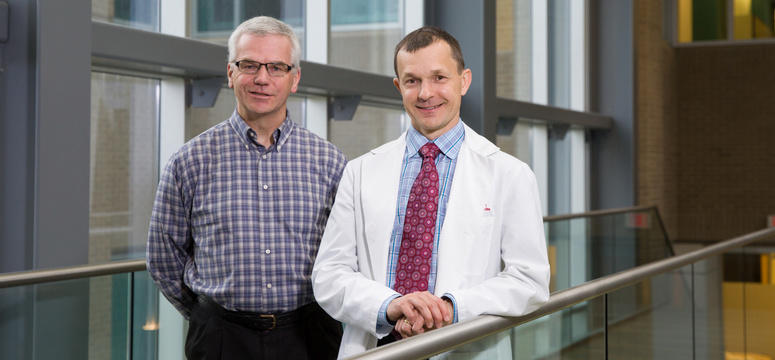May 31, 2019
C3 Research Network Member Dr. Thomas Stelfox Collaborates with Patients' Families to Transform Critical Care in Alberta

Peter Oxland and Dr. Tom Stelfox
When Peter Oxland rushed his ailing wife Barb to emergency hospital care in Calgary, he came face to face with life-changing challenges.
Within a week, they learned that she had a malignant secondary brain tumor. A month later, after slipping into a coma, the mom of three died in the Foothills Hospital’s Intensive Care Unit (ICU) with her family, mother and a chaplain at her bedside.
“Arriving at the emergency department that first time was the start of my journey into the medical world,” says Oxland. “It fast became a roller coaster. I was in a fog and stressed, not used to having such little control over things.”
It was at Foothills that the now retired engineer and IT consultant met Dr. Tom Stelfox, an ICU physician and University of Calgary associate professor of critical care medicine at the Cumming School of Medicine and a member of the O’Brien Institute for Public Health. Dr. Stelfox was part of the compassionate medical team that attended to Barb.
“Tom came in after life support was removed and gave us his condolences which was very meaningful,” says Oxland.
When the researcher met Oxland many months later to discuss the end-of-life care Barb had received, he asked if Oxland would be interested in becoming a family advisor for critical care. Oxland agreed and became a family advisor with critical care, provincially and in the Calgary zone.
Little did the two know that this meeting would lead to a collaboration that would transform the role of “patient and their families in critical care medicine” across Alberta.
'If you can't measure it, you can't manage it'
Dr. Stelfox is in the vanguard of developing new measures of quality of care for critically ill and trauma patients that ensures patients and family members, such as Oxland, are part of the quality improvement process.
“Measurement of care is essential because if you can’t measure it, you can’t manage it,” says Dr. Stelfox, who is also scientific director of the Critical Care Strategic Network, Alberta Health Services. “You need to be able to make adjustments to accomplish what you want.”
Dr. Stelfox and Oxland, now a trained Patient and Community Engagement Researcher (PaCER), collaborated to address these challenges. Their team conducted focus groups and interviews with patients recovering from critical illness — as well as with the families of both recovered and bereaved families from 13 intensive care units in seven cities across Alberta.
ICU experiences include feelings of shock, disbelief and disorientation
Their work described the experiences of critically ill patients and their families with care and identified opportunities for improvement that may not have otherwise been evident.
Family members reported feeling shock, disbelief and disorientation during their loved one’s admission to ICU.
“We have learned some families want more guidance about care in the ICU and recommended that a 'navigator' be available to guide the care journey,” says Dr. Stelfox.
“We also learned that for many patients, the transition from the ICU to a hospital ward, and then back home was not seamless and we need to improve the continuity of care.”
Gathering evidence from families and patients on how to improve care
Dr. Stelfox and Oxland continue to gather research evidence regarding how to improve the care of critically ill patients. Families have flagged wait times among their various concerns along the care continuum.
“Just as we have wait times for procedures, we could one day set wait times for families getting in the intensive care unit,” says Dr. Stelfox.
Meanwhile, Oxland works on teams striving to ensure the environment in ICU is the best it can be for everyone involved — patients, families and ICU providers.
The provincially-focused Patient and Family Centred Care initiative is working toward the development of guidelines to enhance care in the ICU. Dr. Stelfox's work was recognized in 2015 when he was nominated as a Peak Scholar in Entrepreneurship, Innovation, and Knowledge Engagement, joining a community of scholars whose work has had an impact outside of the institution.
“Many of us have had experiences as patients or as a family member of a patient,” says Dr. Stelfox. “Despite our best efforts, people will fall through the cracks. Measurements help us to respond.”
Follow UToday on Twitter or via RSS Feed.
Check the UToday website for news about events, people and trends at University of Calgary.
Follow what’s happening on campus using our interactive events calendar.
